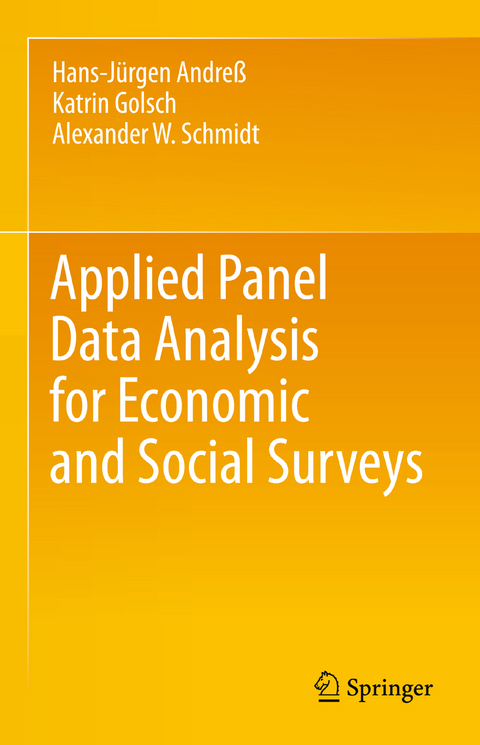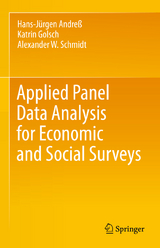Applied Panel Data Analysis for Economic and Social Surveys
Springer Berlin (Verlag)
978-3-642-32913-5 (ISBN)
Many economic and social surveys are designed as panel studies, which provide important data for describing social changes and testing causal relations between social phenomena. This textbook shows how to manage, describe, and model these kinds of data. It presents models for continuous and categorical dependent variables, focusing either on the level of these variables at different points in time or on their change over time. It covers fixed and random effects models, models for change scores and event history models. All statistical methods are explained in an application-centered style using research examples from scholarly journals, which can be replicated by the reader through data provided on the accompanying website. As all models are compared to each other, it provides valuable assistance with choosing the right model in applied research. The textbook is directed at master and doctoral students as well as applied researchers in the social sciences, psychology, business administration and economics. Readers should be familiar with linear regression and have a good understanding of ordinary least squares estimation.
Dr. phil. Hans-Jürgen Andreß ist Professor für Statistik und Methoden empirischer Sozialforschung an der Fakultät für Soziologie der Universität Bielefeld.
Introduction: Benefits and challenges of the panel design.- Outline of the book.- Audience and prerequisites.- Acknowledgements.- Managing panel data: The nature of panel data.- The basics of panel data management.- Three case studies on poverty in Germany.- How to represent a population with panel data?- Conclusion and further reading.- Describing and modeling panel data: Some basic terminology.- Measurements over time are not independent.- Describing the dependent variable.- Explaining the dependent variable over time: typical explanatory variables.- Modeling panel data.- Estimating models for panel data.- Overview of subsequent chapters.- Panel analysis of continuous variables: Modeling the level of Y.- Modeling the change of Y.- Conclusion and further reading.- Panel analysis of categorical variables: Modeling the level of Y: Discrete response models for panel data.- Modeling the change of Y: Discrete-time event history models for panel data.- Conclusion and further reading.- Conclusion: How to do your own panel analysis.- A: Functions of random variables.- B: Estimation and testing: Ordinary least squares.- How to compute a regression model fitting the data?- Sampling and sampling errors.- How to choose between different estimation methods?- How to estimate the parameters of an unknown population with a sample of data?- How to test parameters of an unknown population with a sample of data?- Maximum likelihood .- C: Web site of the textbook.- Bibliography.- Index.
"The monograph considers contemporary statistical analysis of panel survey data with repeated in time measurements on identical individuals, households, firms, nations, or other social entities. ... The monograph presents an excellent introductory textbook on the panel data ... . The book can be very helpful for lecturers, graduate students, and researchers using panel survey methods." (Stan Lipovetsky, Technometrics, Vol. 59 (1), February, 2017)
"This book is written for applied researchers in the social fields. The level of the book refers to users with some theoretical background in statistics and econometrics, but no sound knowledge is required to read the book." (Herbert S. Buscher, zbMATH, Vol. 1276, 2014)| Erscheint lt. Verlag | 25.1.2013 |
|---|---|
| Zusatzinfo | XV, 327 p. |
| Verlagsort | Berlin |
| Sprache | englisch |
| Maße | 155 x 235 mm |
| Gewicht | 645 g |
| Themenwelt | Mathematik / Informatik ► Mathematik ► Wahrscheinlichkeit / Kombinatorik |
| Sozialwissenschaften ► Soziologie ► Empirische Sozialforschung | |
| Wirtschaft ► Volkswirtschaftslehre ► Ökonometrie | |
| Schlagworte | Event History Analysis • Fixed effects regression • Panel analysis of categorical data • Panel Data • Random effects regression |
| ISBN-10 | 3-642-32913-6 / 3642329136 |
| ISBN-13 | 978-3-642-32913-5 / 9783642329135 |
| Zustand | Neuware |
| Haben Sie eine Frage zum Produkt? |
aus dem Bereich




